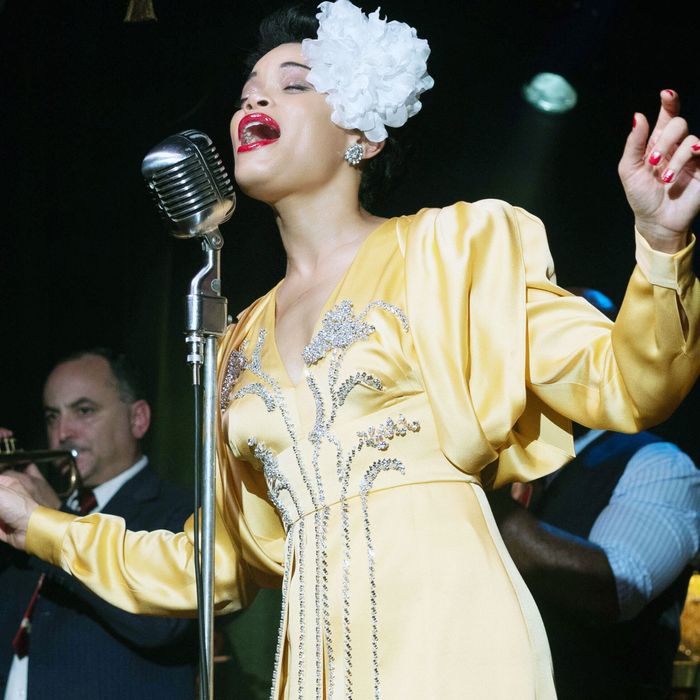
Andra Day in The United States vs. Billie Holiday. Photo: Paramount Pictures/Hulu
Billie Holiday’s life was filled with so much tragedy and triumph that it must count as some sort of accomplishment to make a boring movie about her. It’s even more shocking when you realize that The United States vs. Billie Holiday was directed by Lee Daniels, a filmmaker whose career has certainly had its share of ups and downs (critics will fight endlessly about which titles are the ups and which the downs) but who has never made something that wasn’t at least memorable, even when it was terrible. I haven’t always been on board with it, but the man has a vision. Alas, while his Billie Holiday biopic is handsome and mostly well-acted — particularly by Andra Day in the title role — it’s so leaden and fragmented that it barely makes an impact.
Maybe the problem is one of focus. Written by the Pulitzer Prize-winning playwright Suzan-Lori Parks and based mostly on Johann Hari’s Chasing the Scream: The First and Last Days of the War on Drugs, the film is built around the FBI’s pursuit of Holiday, ostensibly for her drug use but also because of her race and her politics, and in particular her controversial performances of Abel Meeropol’s legendary anti-lynching song “Strange Fruit.” (For a look at the eventful history of that particular song, by the way, check out the intriguing 2002 documentary Strange Fruit, which gets into both the piece’s journey over the decades as well as Meeropol’s own fascinating story.)
Set mainly in the post-WWII period, The United States vs. Billie Holiday (which is out now on Hulu) wants to be a history lesson, but it’s at times so one-note and inert that it loses any sense of authenticity. “She keeps singing this ‘Strange Fruit’ song and it’s causing a lot of people to think the wrong things,” Narcotics Bureau chief Harry Anslinger (Garrett Hedlund) helpfully explains early on, during a smoky, shady meeting with a bunch of politicians and other stuffed-shirts. Among the men is a young Roy Cohn (Damian Joseph Quinn), who declares, “People are calling the song a musical starting gun for the so-called Civil Rights movement.” Someone else advises, with an expository drawl, “You go after that bitch on the drugs!”
The film opens with a boozy, condescending 1957 interview of Holiday by a journalist (“Tell me, what’s it like to be a colored woman?”), and then flashes back ten years, but interestingly (and somewhat confusingly), much of the story is seen through the eyes of earnest FBI agent Jimmy Fletcher (Trevante Rhodes), whom we first meet as a wide-eyed veteran eager for a glimpse of Holiday at the Café Society in New York. After Fletcher ingratiates himself into the singer’s inner circle and sets up her arrest, he struggles with his conscience: He’s convinced drugs are destroying the Black community, but he also realizes that he’s become a tool of a corrupt and racist law enforcement organization. He then turns into a kind of counter-agent, continuing to work for the Bureau while also conspiring with (and romancing) Holiday herself. He even starts taking heroin with her.
The idea of taking one corner of someone’s life and using it as a through line to help connect the disparate dots of a complex story isn’t a bad approach for a biopic. (Think Amadeus, and how it reframed Mozart’s life as a back-and-forth between him and rival composer Antonio Salieri.) And it doesn’t take a daring leap of imagination to connect Holiday’s drug use to the traumas of racism, murder, and abuse that she suffered during her short existence. But for all the simplicity of its script and artless bluntness of its dialogue, this film is also, somehow, amazingly confusing. Daniels and Lori-Parks have a hard time managing basic story dynamics and characters. Men — drug dealers, bandmates, managers — flit in and out of Holiday’s life, but it’s hard to get any real sense of these relationships. Day commands the screen, particularly when she sings, but she actually sings precious little in this film. Meanwhile, Rhodes is an engaging presence as an actor, but the character of Agent Fletcher seems to be here mainly to illustrate his aforementioned central dilemma; he feels like a thesis rather than a person. Indeed, most of the characters in the film seem to exist mainly to underline specific ideas.
In truth, Daniels isn’t much of a storyteller. He’s something more intriguing: a showman and unabashed sentimentalist, capable of mounting risky, emotional sequences that sometimes do away with narrative logic altogether. At times during The United States vs. Billie Holiday, he seems to be resisting all his impulses as a filmmaker — whether in pursuit of artful restraint or simply out of reverence for his real-life subject.
But every once in a while, the picture goes crazy in the best possible way. During one bravura sequence about halfway through, Fletcher and Holiday, touring through the South, wander into the aftermath of a lynching — which then morphs into a trippy dream sequence, as a distraught Holiday staggers through a rickety, drug-haze memory palace, before finding her way onto an elegant nightclub stage where she finally sings “Strange Fruit” all the way through, with a mesmeric passion. It’s an arresting, devastating moment, conveying through technique and form so many of the ideas the film struggles to make tangible through more mundane methods. And it’s a great “Lee Daniels” moment, in a film that otherwise offers surprisingly few of them.
"movie" - Google News
February 27, 2021 at 06:46AM
https://ift.tt/3dPzA1o
Movie Review: United States vs. Billie Holiday, w/ Andra Day - Vulture
"movie" - Google News
https://ift.tt/35pMQUg
https://ift.tt/3fb7bBl
Bagikan Berita Ini














0 Response to "Movie Review: United States vs. Billie Holiday, w/ Andra Day - Vulture"
Post a Comment